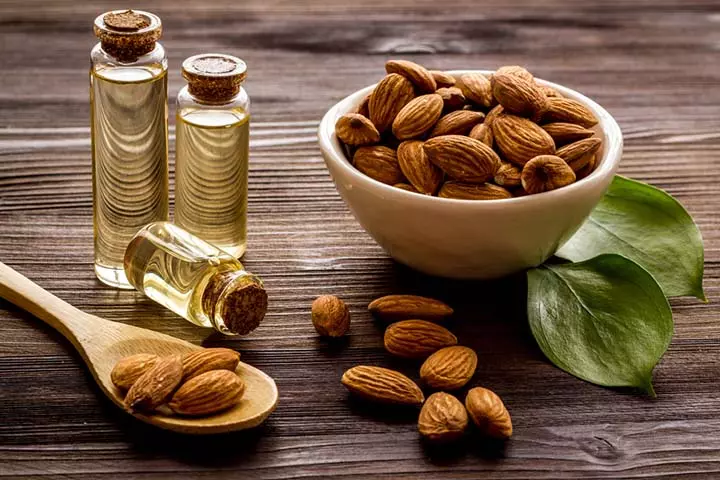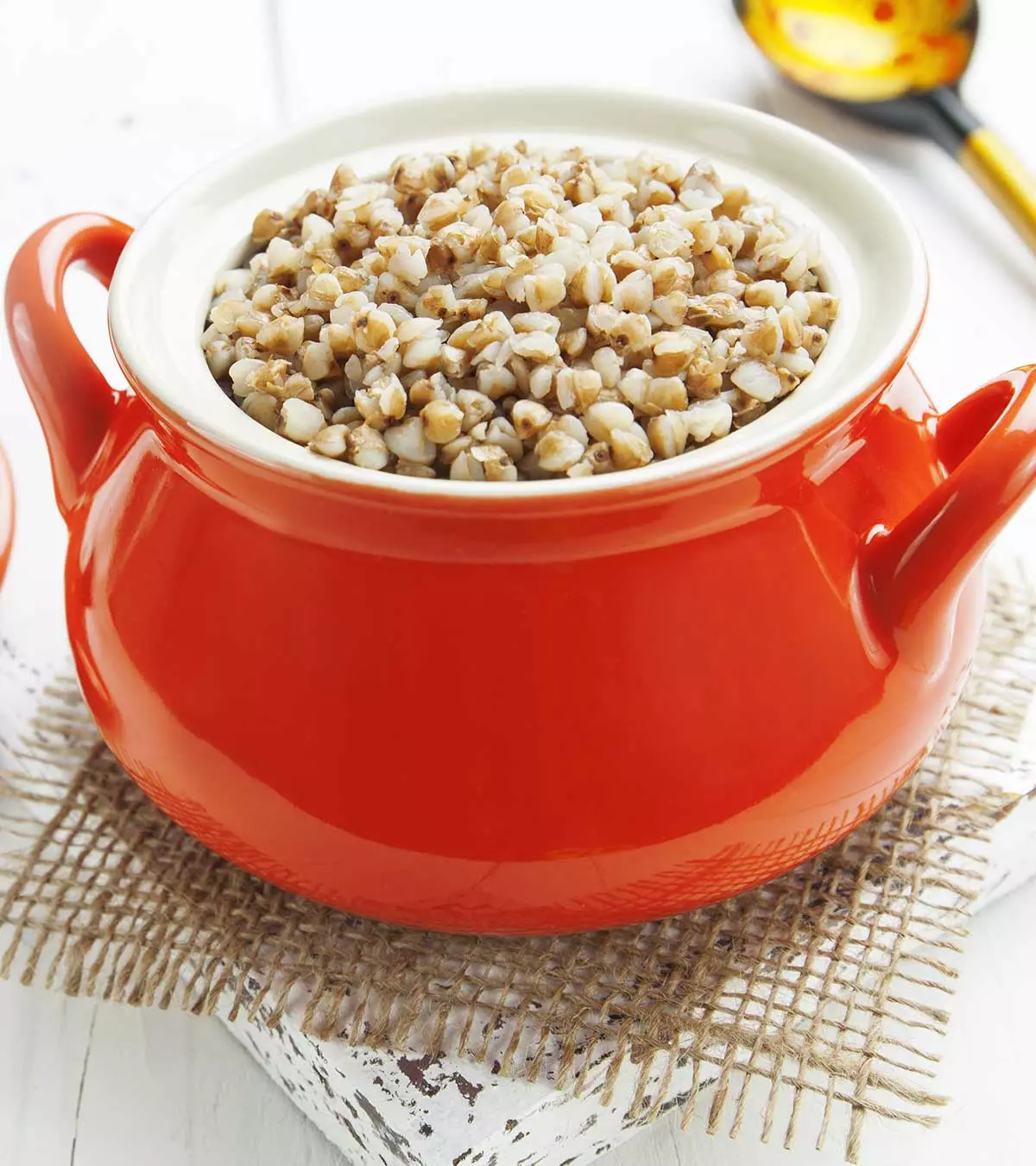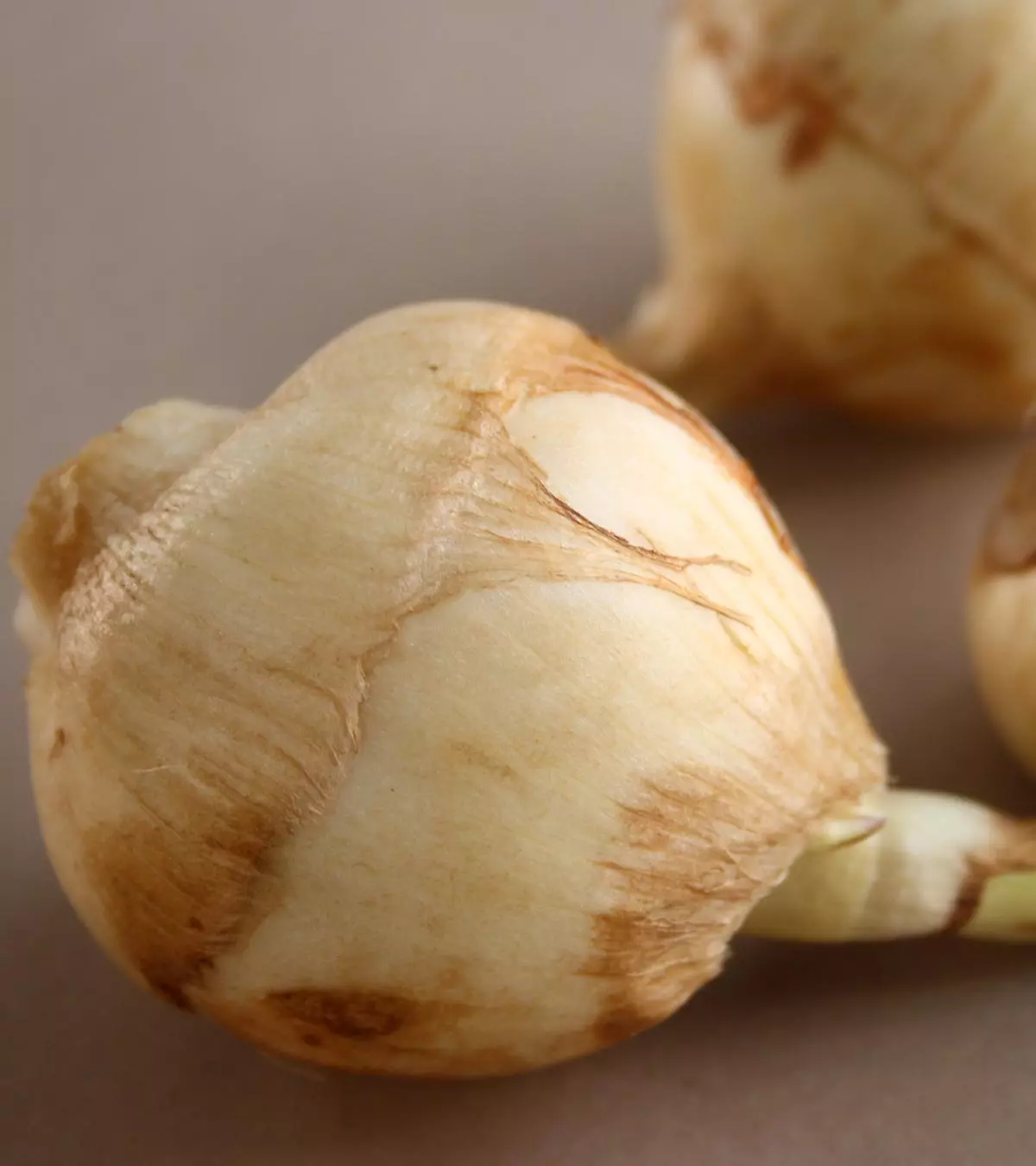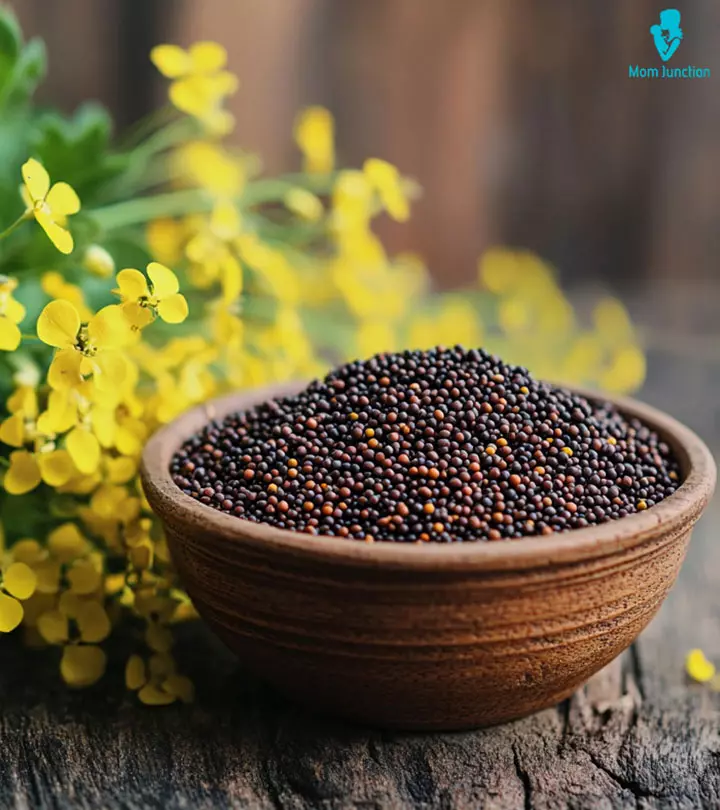
Image: ShutterStock
During pregnancy, regular moisturization becomes especially important to maintain skin elasticity. Therefore, the use of almond oil for pregnancy may have crossed your mind.
Almond oil is mostly used for massaging and can be seen as one of the primary ingredients in lotions or creams. For pregnant women, its regular use can keep the skin moist and may help to prevent stretch marks. However, there are certain precautionary measures that you need to keep in mind while using it.
Scroll through to learn more about the oil, including its benefits and side effects for pregnant women.
Key Pointers
- Almond oil is commonly used as a massage oil instead of lotion or cream.
- Applying almond oil during pregnancy helps maintain skin moisture and manage stretch marks.
- It can be used to treat dryness in various body areas with a gentle massage.
- However, pregnant women should avoid using almond oil if they experience an allergic reaction.
Closer Look At Almond Oil

Image: Shutterstock
Almond oil has various benefits and here is some useful information:
- The oil is derived from the crunchy edible almond nuts.
- Almond oil is used as a major component in skin care products, such as belly rubs.
- It has a light texture and color with a mild nutty aroma.
- Those which are labeled as ‘roasted almond oil’ are used for cooking purposes.
Almond oil is used as a carrier oil that is used to dilute essential oils for topical use, including hair care needs.
Prevent Stretch Marks Using Almond Oil During Pregnancy

Image: Shutterstock
Almonds during pregnancy can provide essential nutrients that support both the mother and the baby. Apart from adding them to your diet, you can also use almond oil to get rid of the stretch marks.
- Sweet almond oil is considered highly beneficial to prevent the formation of stretch marks.
- To effectively prevent stretch marks, apply a generous amount of sweet almond oil to areas prone to stretching, like the stomach, breasts, and thighs.
- You can improve elasticity in these areas by applying sweet almond oil daily.
 Research finds
Research findsDeal With Dryness In Your Skin With Almond Oil

Image: Shutterstock
Dryness during pregnancy is a common problem that usually results from hormonal imbalances. Common issues in pregnancy are:
- Pain in chest
- Upper back
- Face
- Dryness in different parts of the body like legs and arms.
When you choose beauty products during pregnancy, you need to be very careful. Almond oil can be applied safely in any part of your body for different prenatal care purposes. To enjoy the best benefits, you can apply it before and after a shower.
Treatment Of The Perineal Area
When you are pregnant, treatment of the perineal area becomes necessary. Let us have a look:
- The perineal area is situated between the vaginal opening and the anus. This area is prone to tearing during pregnancy because of childbirth.
- You can apply almond oil and massage the area for five minutes to provide nourishment to the skin and make it supple and elastic. Be sure to apply it just to the skin and not to the vaginal mucosa.
- Almond oil used for applications contains essential properties that keep your skin soft.
Be Safe:

Image: Shutterstock
While almond oil is generally considered safe in pregnancy, you need to be careful before using it. Here are some considerations you must keep in mind:
- Always conduct a patch test before use to check for allergies.
- Do not use almond oil if you are allergic to it or have a history of nut allergies.
- Stop using it if you experience itching of any type.
- The oil is also used as a laxative at times, which is not recommended in your pregnancy.
- Consult your doctor before you take it as a laxative, as it might cause contractions and lead to premature labor.
 Caution
CautionYou must avoid the bitter variety of almond oils during pregnancy which are manufactured from bitter almonds. Bitter almonds are known to increase the risks of birth defects in children.
Frequently Asked Questions
1. What is the recommended daily dosage of almond oil for pregnant women?
There are no exact recommendations regarding the dosage of almond oil for pregnant women.
2. Is almond oil suitable for all skin types during pregnancy?
Almond oil is usually suitable for all skin types and dehydrated skin during pregnancy.
3. What are some natural alternatives to almond oil that pregnant women can use?
Using cocoa butter, coconut oil, and olive oil during pregnancy may help with stretch marks as an alternative to almond oil. However, scientific studies do not support their efficacy (3).
4. Can almond oil be used to help relieve pregnancy-related aches and pains?
Almond oil may be used for body massage to relieve aches and pains. However, almond oil alone has not been reported to help with pregnancy-related pains. Instead, almond oil is used in conjunction with essential oils to help alleviate aches and pains.
5. Does almond oil help reduce pregnancy-related swelling?
A study shows that massaging the feet with sweet almond oil may reduce pregnancy-related swelling (4).
Sweet almond oil has been used for massages for a long time. It makes the skin soft and increases its elasticity. Therefore, it is common to use almond oil for pregnancy stretch marks and dryness. You may rub the oil on your breasts, stomach, and thighs for maximum benefits. Although almond oil is considered safe for most women, you should avoid it if you are allergic to it or have developed an itching sensation. Consult a doctor if you haven’t used almond oil before. Also, do not use the oil as a laxative without your doctor’s recommendation.
Infographic: Using Almond Oil To Prevent Pregnancy-Induced Stretch Marks
Almond oil is highly emollient. So it is easily absorbed by the skin. It can also be used as a moisturizer and applied to the areas where stretch marks are present. Vitamin E in almond oil is known for its skin-repairing properties. Read this infographic to find out how to use it on your skin.

Illustration: Momjunction Design Team
Illustration: Is It Safe To Use Almond Oil During Pregnancy?

Image: Stable Diffusion/MomJunction Design Team
References
- Sermin Timur Taşhan and Ayşe Kafkasli; (2012); The effect of bitter almond oil and massaging on striae gravidarum in primiparaous women.
https://pubmed.ncbi.nlm.nih.gov/22594386/ - F. Facchinetti et al.; (2012); Herbal supplements in pregnancy: unexpected results from a multicentre study.
https://academic.oup.com/humrep/article/27/11/3161/811869 - Stretch Marks.
https://my.clevelandclinic.org/health/diseases/10785-stretch-marks - Maryam Navaee and Marzieh Rakhshkhorshid; (2020); Comparing the Effect of Foot Massage with Grape Seed Oil and Sweet Almond Oil on Physiological Leg Edema in Primigravidae: A Randomized Clinical Trial.
https://www.hindawi.com/journals/ecam/2020/6835814/
Community Experiences
Join the conversation and become a part of our nurturing community! Share your stories, experiences, and insights to connect with fellow parents.
Read full bio of Dr. Karla S. Sanchez-Banos
- Dr. Mohit Saraogi is a gynecologist and infertility expert with 30 years of experience. He is the founder of IRIS IVF Clinics in Mumbai. Dr. Saraogi is an alumnus of Seth G.S. Medical College and King Edward Memorial Hospital, with several national and international publications in his name.
 Dr. Mohit Saraogi is a gynecologist and infertility expert with 30 years of experience. He is the founder of IRIS IVF Clinics in Mumbai. Dr. Saraogi is an alumnus of Seth G.S. Medical College and King Edward Memorial Hospital, with several national and international publications in his name.
Dr. Mohit Saraogi is a gynecologist and infertility expert with 30 years of experience. He is the founder of IRIS IVF Clinics in Mumbai. Dr. Saraogi is an alumnus of Seth G.S. Medical College and King Edward Memorial Hospital, with several national and international publications in his name.
Read full bio of Rebecca Malachi
Read full bio of Swati Patwal
Read full bio of Dr. Joyani Das





















